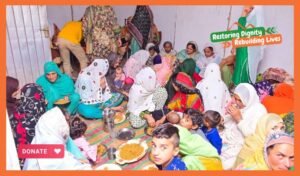
As the Islamic lunar calendar continues to mark the passage of time, Muslims around the world eagerly anticipate the arrival of Ramadhan, a month of spiritual reflection, self-discipline, and acts of worship. With its exact timing determined by the sighting of the moon, Ramadhan 2024 is expected to commence on 11th March subject to the official announcement by the religious authorities. Let’s delve into the significance of this holy month and explore the key priorities for Muslims during this time.
A Month of Reflection and Devotion
Ramadhan holds immense significance in the Islamic faith as it commemorates the revelation of the Quran to the Prophet Muhammad (peace be upon him). Muslims view this month as an opportunity for self-reflection, seeking forgiveness, and strengthening their relationship with Allah. Fasting from dawn to sunset is a fundamental aspect of Ramadhan, encouraging self-discipline, empathy, and gratitude.
Key Priorities of Muslims in Ramadhan
While fasting is the most visible aspect of Ramadhan, there are several other key priorities that Muslims focus on during this sacred month:
1. Increased Acts of Worship
During Ramadhan, Muslims engage in additional acts of worship such as performing extra prayers, reciting the Quran, and engaging in supplication. The nights are particularly special, with the observance of Taraweeh prayers, which are performed in congregation.
2. Strengthening Family and Community Ties
Ramadhan is a time for Muslims to come together as a community and strengthen their bonds. Families gather for suhoor (pre-dawn meal) and iftar (meal to break the fast) to share the blessings of this month. It is also common for Muslims to invite neighbors, friends, and colleagues to join them for iftar, fostering a sense of unity and generosity.
3. Self-Reflection and Personal Growth
With the fast-paced nature of modern life, Ramadhan provides a much-needed opportunity for introspection. Muslims are encouraged to assess their actions, seek forgiveness for past wrongs, and strive for personal growth. This includes practicing patience, controlling one’s anger, and refraining from negative speech or behavior.
Giving Charity in Ramadhan
Charity, or “zakat,” is a fundamental pillar of Islam, and its significance is amplified during Ramadhan. Muslims are encouraged to give generously to those in need, as this act of kindness holds immense rewards. The act of giving not only benefits the recipients but also purifies the soul and strengthens the spirit of empathy within the community.
During Ramadhan, many Muslims choose to give their zakat or engage in additional acts of charity, known as “Sadaqah.” This can take various forms, including providing food for the less fortunate, donating to charitable organisations, or contributing to community projects that benefit society as a whole.
Moreover, Ramadhan is also a time when Muslims engage in a special form of charity known as “Fitranah.” Fitranah is a mandatory donation given by every Muslim before the end of Ramadhan, which serves as a means to purify one’s fast and assist those who are less fortunate in celebrating Eid-ul-Fitr, the festive culmination of Ramadhan.
A Time of Spiritual Renewal
As we eagerly await the arrival of Ramadhan 2024, let us embrace this sacred month with open hearts, minds, and a commitment to self-improvement. May it be a time of reflection, unity, and giving back to our communities, ultimately strengthening our faith and fostering a more compassionate world.
Ramadhan serves as a spiritual reset for Muslims, allowing them to cleanse their hearts, minds, and souls. It is a time of increased devotion, selflessness, and acts of kindness. Muslims strive to embody the values of compassion, gratitude, and humility throughout this blessed month, carrying these virtues forward beyond Ramadhan.
 Quick Donate
Quick Donate  Latest Updates
Latest Updates Contact Us
Contact Us






















